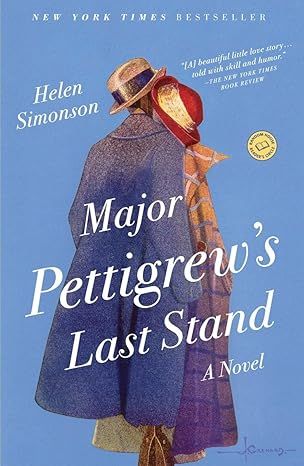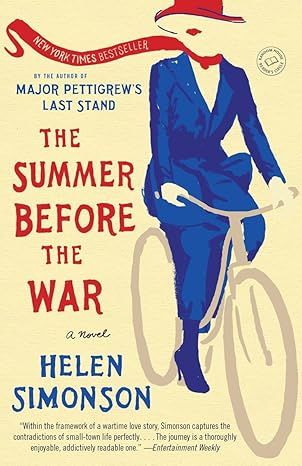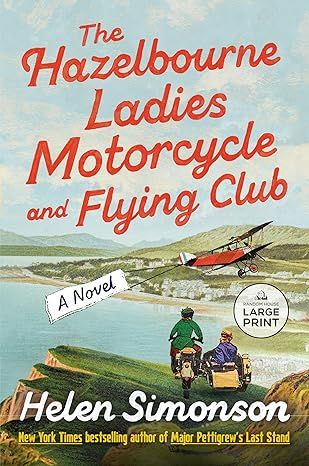Major Pettigrew's Last Stand: A Novel
4.4 out of 5
8,863 global ratings
Written with a delightfully dry sense of humour and the wisdom of a born storyteller, Major Pettigrew's Last Stand explores the risks one takes when pursuing happiness in the face of family obligation and tradition.
When retired Major Pettigrew strikes up an unlikely friendship with Mrs. Ali, the Pakistani village shopkeeper, he is drawn out of his regimented world and forced to confront the realities of life in the twenty-first century. Brought together by a shared love of literature and the loss of their respective spouses, the Major and Mrs. Ali soon find their friendship on the cusp of blossoming into something more. But although the Major was actually born in Lahore, and Mrs. Ali was born in Cambridge, village society insists on embracing him as the quintessential local and her as a permanent foreigner. The Major has always taken special pride in the village, but will he be forced to choose between the place he calls home and a future with Mrs. Ali?
BONUS: This edition contains a Major Pettigrew's Last Stand discussion guide.
384 pages,
Kindle
Audiobook
Hardcover
Paperback
Audio CD
First published December 31, 2010
ISBN 9780812981223
About the authors
Helen Simonson
Helen Simonson is the New York Times bestselling author of Major Pettigrew's last Stand (2010) and The Summer Before The War (2016). Her newest novel, The Hazelbourne Ladies Motorcycle and Flying Club will be published in May 2024. She was born in England and spent her teenage years in a small village near Rye, in East Sussex. A graduate of the London School of Economics, with an MFA from Stony Brook Southampton, she is a former travel advertising executive, dual US/UK citizen and a proud New Yorker. Helen is a longtime resident of Brooklyn and is married with two sons.
Read more
Reviews
Dandelion
5
Darling
Reviewed in the United States on May 9, 2014
Verified Purchase
Major Pettigrew's Last Stand is a love story and slightly predictable, but the characters are wonderfully portrayed and the circumstances surrounding the romance are well written. It is a social comment about class differences and race differences. The conversations between the Major and his son are so right on that I wanted to spank the son for his snobbish, self-centered behavior. That goes double for the various ladies who think they are in charge of everything and try to manipulate the Major and everyone else. There ignorance is shocking but true to character. The language is straightforward with little flowery language. Major Pettigrew was born in India but is now living in a small English town as a widower. He has one son who is overly conscious of making an impression and making money. The Major's brother dies and he needs a ride to get to the brother's house. The owner of a small shop, Mrs. Ali (Indian, Moslem, born in London) gives him the ride. She is a widow with no children but has a nephew from Indian who is helping in the shop and expects to be given it. He is overly concerned about "proper" behavior of his aunt. She is being pressured to give up her shop to the nephew and go to her husband's relatives and act as nursemaid for an old grandmother. The major's brother's wife has a very valuable gun, one of a pair and the Major has the other. It was expected that the guns would be brought together after the death of either brother. Everyone is greedy to make the Major sell the pair and get money but he does not want to. Of course the town and the relatives do not approve of any relationship between Mrs. Ali and the Major. Mrs. Ali's nephew and later her brother-in-law try to manage her meetings with the Major and she must learn to get around them and assert herself. The conflicts are well written and could take place anywhere with slight variations. Of course there is an English lord and everyone wants to be invited to his hunting parties. There are some subplots over the lord's selling of his land and the property. There is a wonderful portrayal of an American business man who dares to call the lord "Double D" and has not got a clue how to dress for a hunt. In other words he is a clod. The only improvement I would have for this novel is that Mrs. Ali's personality and conflicts are not well developed. They get short paragraphs at best and mostly developed at the end of the novel. It is clear why Major Pettigrew likes and grows to love her, but why she is attracted to him is not as clear. We are told quite a bit about the Major and his marriage and son, but not anywhere as much about her. Given that short-coming, I would still recommend the book for a good read.
Read more
4 people found this helpful
Kindle Customer
5
Wonderful book deals with relevent issues
Reviewed in the United States on June 9, 2024
Verified Purchase
Modern setting in small English town. Focus is alive story. But, there are myriad tensions on many levels. Interracial, generational, class, economic disparity, property development, bequests, expectations all of these relationship and ethical issues are woven into a multigenerational story. Sounds like it would be a heavy tome, but it's a delightful, fast-paced read; took me less than 2 days while recovering from my second bout of Covid. Highly recommend!
Read more
LL
5
Major Pettigrew's Last Stand
Reviewed in the United States on January 7, 2011
Verified Purchase
This book is a serious gem. It is obvious to me why it is being touted as one of the best books of 2010. The story is about Major Pettigrew, a widower with an obnoxious son and one half of a highly valuable set of Churchill guns, left to him by his father. When Bertie, Major Pettigrew's brother and possessor of the other half of the set of guns, passes away, Major Pettigrew is stumbled upon by Mrs. Jasmina Ali, the local grocery store owner and a widow. In an effort to help the grieving Major Pettigrew, Mrs. Ali drives him to the funeral and captures his heart. However, despite their common interests and mutual understanding, differences in race and social status threaten their infant relationship. Will they be able to overcome the prejudices of their community?
There are so many things I love about this book, I hardly know where to begin, but since the cover is the first thing anyone sees, I'll start with that. Two coats and two hats hang together on a coatrack in such a way that they look like two people embracing. I think this is a very good symbol for the book. Major Pettigrew and Mrs. Ali's interactions and expressions are very subtle and understated. They come together emotionally long before they even approach coming together physically by spending afternoons talking about Kipling and drinking tea.
Major Pettigrew's Last Stand has been compared to Jane Austen, and I can see the likeness. Simonsen uses wry comments thick with subtle meanings to deliver the messages of the story. The difference is that while delivering this slightly sarcastic lines, Simonsen is making fun of modern society. This "comedy of manners" was more enjoyable to me than a Jane Austen novel because I was in on the joke. She did make several disparaging comments about Americans, but as several of them were pretty apt descriptions, they just made me laugh instead of offending me. My favorite - "Americans seemed to enjoy the sport of publicly humiliating one another." (p 23)
The characters were just as charming as the writing style. I found myself wanting to hug Major Pettigrew throughout the book. His frustration with aging, his still piercing grief for his wife, and his blossoming attraction for Mrs. Ali combined seemingly contradictory elements into a very whole, realistic and sympathetic character. He was imperfect and confused, but completely ready to follow his heart. And it is easy to see why it points to Mrs. Ali. Despite her age, she is described as beautiful and exuberant - "She had opened her window slightly and the rush of air blew ripples in her rose silk headscarf and tossed stray black locks of hair across her face." She is educated and literary, able to speak with the Major about their love of country and their grief for their spouses.
The lesser characters are also fully fleshed out with personalities, idiosyncrasies, and redeeming qualities, even in the most obnoxious. Yes, the Major's son Roger takes advantage of him, dropping by uninvited, asking the Major to change his plans, making serious relationship steps in text messages. However, he does occasionally listen to the Major, making some small steps into becoming a less annoying person. Mrs. Ali's fanatically religious nephew, while grumpy and judgmental, does learn to appreciate the Major instead of seeing him as an infidel and possible corrupter of his aunt's virtue.
The plot, while very quiet at the beginning, steadily gains speed to a surprising climax at the end. The barriers between Major Pettigrew and Mrs. Ali multiply and threaten their relationship throughout the book, not just in verbal insinuations but in a very dangerous way. At the beginning, when things are slower, the beautiful writing and fresh characters kept my interest, but by the ending, the unfolding events of the plot would have interested me even if they writing was of a lower caliber.
I would recommend this book to anyone. While it is a love story, there is much more to the book than romance. The characters deal with the changes that come with age, losing beloved relatives (and dealing with less-beloved relatives), overcoming social and racial ignorance, changing traditions, relationships between parents and children... The list goes on. Simonsen has painted human nature in a beautiful setting and framed it with an exciting, touching story. Read it!!
Accessibility/readability - I definitely had to look up a few words, but the book was not too weighty or difficult to read. The story flowed. And who doesn't love improving their vocabulary? Literary merit/Aesthetics - 5. Characters - 5 Plot - 5 Personal response - 5 Overall - 5
Read more
14 people found this helpful
Kindle Customer
5
Quite enjoyable
Reviewed in the United States on July 26, 2024
Verified Purchase
A small country village is full of people stuck by social expectations into roles that don't fit them. You'll find yourself rooting for them. This is an enjoyable story!
S. D. Wright
5
Taking a Chance Paid Off
Reviewed in the United States on January 23, 2011
Verified Purchase
I bought this book on a whim, having only read the descriptions and a few reviews. I LOVED it! First, it is well written -- and by that I mean that the author uses language exquisitely. Her turns of phrase, whether coming from Major Pettigrew or Mrs. Ali or the narrator, are sharp, funny, poignant, and unexpected. She is able to imbue the main characters with incisive sarcasm that hardly ever makes them come across as mean spirited. I laughed out loud (on the train, no less!) all through this book.
More than the prose, however, the characters themselves make this a stellar book. I pictured Major Pettigrew as one of those bluff, walrus-mustached "pip-pip, wot wot" post-Victorian age British men who long for a good shoot on safari in deepest darkest Africa. That lasted about a chapter. After that, the layers begin to be peeled away, and the character becomes more and more faceted. He's not perfect, by any means; his singular fascination with reuniting the hunting guns shows him in a fairly negative light, but that's balanced with the fact that he is so clear-eyed about himself and others. His bafflement with the modern world and the deterioration of community and manners quickly starts to make sense, and on a number of occasions, I found myself taking his side. He compares himself unfavorably with his late wife's open-mindedness, even as he's not willing to challenge the narrow racial status quo. He knows he should be better, tries to get there, doesn't always make it.
By contrast, Mrs. Ali is a delightful character who turns out to be a little too stubborn for her own good. Her tart dialogue is a worthy match for the Major's sharp observations. I liked how the author didn't just use one token Pakistani character to represent all; Mrs. Ali is nicely balanced (and challenged) by the Khans, her nephew, and the thoroughly English dancer-cum-reluctant shopgirl. Likewise, the English characters spanned the spectrum of attitudes just as they would in real life. Only a few of them veered close to having no redeeming qualities.
This is a smart, sometimes hilarious, book. I highly recommend it.
Read more
2 people found this helpful
Capricorn One
4
A wonderful story and a great read
Reviewed in the United States on January 23, 2011
Verified Purchase
I loved this book. As a baby boomer, I quickly empathized with the title character despite the cultural differences. Major Pettigrew, a retired (India campaign) British Army Officer, is a bastion of proper British values spending his retirement years at his small estate in the English countryside. Comfortable in his retirement, the death of his wife six years previous has left a void in his life. His only son is a 30 year old London-based banker who is the moral opposite of his father, disdainful of his father's narrow cultural perspective and openly fixated on his own needs, from his attractive and pleasant but decidedly "un-British" American fiancee to moving up the career ladder to greedily discussing his father's advancing age and the property he'll inherit. In the midst of this, the Major makes acquaintance with a Pakistani woman, 10 years his junior and also a widower, who runs the local village 'quick stop' market where villagers pick up the necessities in between major shopping trips to larger stores. What begins as a common interest in literature, specifically Kipling, turns into more in a very slow, steady, and compelling way filled with wonderful drama, dialogue, and insights into everything from the lifestyle of the landed gentry (hunts, "the club", golf, etc) and the challenging social strata and tensions of the British and the Pakistani woman and her relatives. Over time (and very good reading) the Major and "Ms. Ali" go counter to these social pressures as they become more of "a couple", but circumstances drive them apart. All ends well (albeit with lots of delicious dialogue and precarious situations) as they find their moment of opportunity and make the decision to go forward in life together. The author does a wonderful job of drawing together parallel story lines of Major Pettigrew's son, Ms. Ali's family challenges, the local backlash and ethnic views of the local British society matrons and gentry, all the while building up the slow maturing of a wonderful love story. The dialogue is wonderful - along the lines of the Jane Austen books in portraying English manners and morals. And adding in the consistent back story of the prized pair of shotguns is pure genius. All in all, a great book.
Read more

The Garden Interior
4
"A Bold and Fragrant Brew of Comedy"
Reviewed in the United States on October 14, 2013
Verified Purchase
This is a charming story set in the small Sussex country town of Edgecombe St. Mary, and revolves around the eponymous major and Jasmina Ali. He is retired from the British Army and is a former schoolteacher, she is a British-born Pakistani shopkeeper. Both lost their spouses in recent years and are trying to cope with the grief from that and with all the other grief that modern life throws at each of us. On top of that, there is a broad layer of comedy and petty manners that afflict and harass English village life, as they always have. There is a curiously cinematic quality to this book. Scenes are sparingly but very vividly described, and after one scene closes you feel you have seen it in a film. The dialogue is very finely etched and every utterance is as freighted with nuance, social meaning and the possibility of kindness or meanness as any dialogue in a Jane Austen drawing room. The two main characters are drawn together by their unhealed grief for their lost spouses, by their intelligence and love of books, and most of all by their devotion to high standards of civility and innate decency. The subtle and unsubtle ways the young miniaturize and marginalize the old is a broad secondary theme, represented by Pettigrew's son and Ali's extended family. They are watched sharply for signs of confusion or incompetence, and every moment of nostalgic reflection is seen as possible evidence of decline or dementia, and so on. The sly humor of Kingsley Amis is afoot here, along with delicious dollops of William Boyd and even at times P.G. Wodehouse. Repulsive characters afflict the hero and heroine in unpleasant and ludicrous situations, all told in a soothing deadpan narrative that enhances the broadly comical effect. All the petty conventions and strictures of village life are explored and skewered mercilessly, until the reader cringes with sympathetic suffering for the main characters' social dissection from the tiny sharp knives of small town neighbors, oppressive gossip and polite convention. I thought the dramatic and comical climaxes of the book were a bit rushed and formulaic, but all in all the storytelling proceeds at a lovely pace and is very satisfying. A great deal of tea is drunk in this book, gallons of it, and much is made of the social and sensual drinking of tea, but this book is a bold a fragrant brew of stimulating goodness and is not to be missed for its lively, compassionate and intelligent portrait of two deeply conventional people struggling for happiness and against oppressive convention.
Read more
12 people found this helpful
Kindle Customer
4
England, cozy and all that, just the way we imagine it
Reviewed in the United States on May 14, 2010
Verified Purchase
Very British. Very proper. How very, very satisfying, like a cuppa hot tea on a cold, blowy day. We first meet the 68-year-old Major Ernest (no other first name would really suffice) Pettigrew of Helen Simonson's first novel as he opens his front door to greet a morning caller. The Major is teary eyed and wearing his late wife Nancy's dressing gown. "A quick rush of embarrassment flooded to the Major's cheeks and he smoothed helplessly at the lap of his crimson, clematis-covered housecoat with hands that felt like spades.
'Ah,' he said."
Mrs. Jasmina Ali, the owner of the village shop 'n' go in Edgecombe St. Mary's in Sussex, is calling to collect on behalf of the paperboy who happens to be ill. Opening the door, Major Pettigrew is bereft and off balanced enough to be traipsing around wearing his late wife's best housecleaning dress.
He has recently received the unexpected news that his brother Bertie has died. It is up to Mrs. Ali, Pakistani or Indian by descent and herself a widow, to steady and comfort the Major. The Major and Mrs. Ali don't quite understand it yet, but as readers we witness in the first three pages the first blush of love between these two casual acquaintances.
Among the story elements that draw the Major and Mrs. Ali together is a valuable matched set of hunting rifles, a treasured gift given long ago to the Major's father from an appreciative maharajah. At their father's death, the Major and Bertie each received one of the Churchill shotguns with the understanding that the matched set would be reunited when either of the brothers died. To the Major's consternation, Bertie's widow is advised that there is money to be made and placing fealty to her departed husband aside, resists giving up the heirloom; so the conniving begins.
The cast of this comedy of manners is vividly portrayed. Among them is the Major's insufferable son Roger and his American girlfriend Sandy. Among Roger's foibles is his preference for speakerphone although the Major says it sounds as if he's calling from a submarine: "My chiropractor doesn't want me holding the phone under my chin anymore but my barber says a headset encourages oily buildup and miniaturization of my follicles," Roger whines.
We have Mrs. Ali's nephew Abdul Wahid and his parents to entertain us as well as the women of Edgecombe - Daisy, Alma, Grace and Gertrude - and Lord Dagenham, who is a member of the landed gentry scraping to hold onto his ancestral fief. It is the ladies of the town who busy themselves organizing a disastrous club dinner dance that includes an "entertainment" based on the 1947 Partition of India.
The book has the feel of a classic B&W movie, the kind that begs to be viewed on a cold winter night with a fire on the grate and a plate of cookies and a glass of milk nearby. Enchanting without being saccharine, the characters populate the English village of our imagination. Most everyone in Edgecombe earns our esteem with their fortitude. They are well intentioned and all rendered just-so. They're a hoot to get to know and follow around.
Read more
5 people found this helpful
Sharon
3
Masterpiece Theater ….
Reviewed in the United States on July 17, 2024
Verified Purchase
is going to pick this one up. Even in a small, English village where we know everyone, there is evidence of discrimination and prejudice. I love it when good comes through and the good guys win. (A cancer group book club pick)
H. Foster
3
Charming love story, but slow
Reviewed in the United States on April 11, 2011
Verified Purchase
I really want to give this book 4 stars because it's a unique, charming love story that kept me riveted at moments. I adored the two main characters. But it's also painfully slow and overly descriptive, so I'll stick with 3 stars. The humor is very dry and subtle, very British, which I normally love in a book or movie, but here it is SOOO understated, it loses some of its charm. And the romance is the same, very understated -- which is a refreshing change of pace. But at times the plodding pace failed to hold my attention. If the author had picked up the pace a little, it would have been a 5 star favorite. It shows the charm of small town life, with all its quirky characters. But some of those characters and situations are exaggerated to the point of rediculousness. Roger is one character that was portrayed with such negative extremes, I just wanted him to go away and didn't want to read his scenes. I loved the guns side story -- very believable; we all obsess over stupid things now and then. I give this book a mild recommendation and will read the author's next book, hoping it moves a little faster.
Read more
2 people found this helpful
Top Helen Simonson titles
Best Sellers

The Tuscan Child
4.2
-
100,022
$8.39

The Thursday Murder Club: A Novel (A Thursday Murder Club Mystery)
4.3
-
155,575
$6.33

Sapiens: A Brief History of Humankind
4.6
-
140,302
$13.49

The Butterfly Garden (The Collector, 1)
4.3
-
88,556
$9.59

Things We Hide from the Light (Knockemout Series, 2)
4.4
-
94,890
$11.66

The Last Thing He Told Me: A Novel
4.3
-
154,085
$2.99

The Perfect Marriage: A Completely Gripping Psychological Suspense
4.3
-
143,196
$9.47

The Coworker
4.1
-
80,003
$13.48

First Lie Wins: A Novel (Random House Large Print)
4.3
-
54,062
$14.99

Mile High (Windy City Series Book 1)
4.4
-
59,745
$16.19

Layla
4.2
-
107,613
$8.99

The Locked Door
4.4
-
94,673
$8.53



